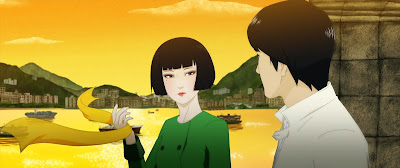1. Vigil (Vincent Ward, 1984)
Not to be confused with the recently released (mediocre) horror
The Vigil (2019), Vincent Ward’s feature-length debut is a one of the most grandiose coming-of-age tales to ever grace the big screen. Filmed on an isolated farm in Northern Taranaki, New Zealand, where time appears to flow differently than elsewhere, it turns the gloomily breathtaking location into a character in its own right that joins a perfectly cast quartet of young Fiona Kay, and her more experienced colleagues – Penelope Stewart, Bill Kerr and Frank Whitten. Told from a perspective of a budding girl, Lisa (nicknamed Toss), with an imagination as wild and wide as her surroundings, this engagingly strange drama vividly captures the verdant nature in the astonishing, state-of-the-art cinematography (many kudos to Alun Bollinger), and employs mud – oft-glued to its protagonists’ clothes, hands and faces – as a poetic leitmotif. On an aural level, it provides a mystifying mix of intense silences, broodingly bizarre score (Jack Body) and cacophony of diegetic sounds, pulling you deeper both into its forbidding physical world and Lisa’s wondering and wandering thoughts...

2. Free Guy (Shawn Levy, 2021)
A strong contender for the most pleasant surprise of the year, Free Guy effortlessly blasts away all of its blockbuster competitors of recent years, especially those who have toyed with the idea of burring/erasing the boundaries between a film and a video game. (Sorry, Mr. Spielberg, but this neat ‘little’ flick is everything that Ready Player One wanted to be and much MORE!) Behind the flashy, over-the-top special effects, the stardom of Ryan Reynolds who readily jumps into the comedic role of the (virtual) good guy, and the raising popularity of Taika Waititi who chews the scenery with gusto as the (real world) antagonist, there’s a big heart strongly beating, and a clever mind slyly subverting the entertainment industry. That is a pretty bold, if risky and antithetical move, but it works like a charm!
Now, I’ve never played simulation or open world games (I’m mostly into fighters and beat ‘em ups), yet I had a whale of a time watching Free Guy, frequently laughing WITH (and not AT) it, while Levy made me root for the unlikely hero that didn’t even exist within the (imaginative) universe of the film itself, because he was a non-playable character of a zany Sim City parody. On top of that, I felt invigorated and inspired, at once like a child discovering (multi-genre) cinema for the first time, and like an experienced cinephile who is occasionally in a desperate need of a cinematic chewing gum whose taste lasts much longer than expected. Besides, how can anyone resist such sweet, sweet, yet ironically/irreverently tongue-in-cheek use of Mariah Carey’s 1995 single Fantasy? It is highly possible that I am giving Free Guy more credits than it deserves, but my inner nerd still screams of happiness and excitement, so I just can’t help it.
3. The Rainbowmaker (Nana Dzhordzhadze, 2008)
In Nana Dzhordzhadze’s surreal, absorbing and bitterly sweet dramedy, Death (Nino Kirtadze in a scene-stealing performance) is a flirtatious lady who wears white dress, sports golden afro curls, adores late-night snacks, and has a soft spot for old Georgi (Ramaz Chkhikvadze, brilliantly funny) who takes care of his mischievous grandchildren, a girl and a boy (adorable first-timers Elene Bezarashvili and Iva Gogitidze). Georgi’s tall tales of their father and his son Datho (superb Merab Ninidze) make the kids’ imagination run wild, while the unfortunate (falsely accused) man actually serves his time in prison. Once Datho returns home, the little ones refuse to accept him, and he finds his enchanting wife Elene (magnetic Anja Antonowicz) in the embrace of a brutish fire-eater, Zorab (Tom Urb, ominously seductive). But everything changes after he gets struck with a ball of lightning, and a mysterious pilot, Lia (always reliable Chulpan Khamatova), brings some love from the sky...
Brimming with strange, yet infectious energy and re-kindling your admiration for cinema in virtually every frame, The Rainbowmaker is a dreamlike, briskly paced fable with a big heart of gold, and directed with a keen sense of magic realism. Its childlike innocence is warmly complemented by burning passion and whimsical attitude that together elevate a simple story to poetic heights. The charming seaside setting adds an extra layer to its modest, yet captivating beauty.
4. Prisoners of the Ghostland (Sion Sono, 2021)
... and the award for the most bonkers meta-neon-chambara-pseudo-apocalyptic-camp-western-comedy-mystery with the elements of dream-logic fantasy and a pinch of body horror goes to Sion Sono for PRISONERS OF THE GHOSTLAND! In other words, it’s a WTF-did-I-just-watch masterpiece!
5. The House That Eats the Rabbit (Cosmotropia de Xam, 2021)
If Lewis Carroll and Jean Rollin had been raised from the dead to collaborate on a trippy phantasmagoria commissioned by
Experimental Film Society, the result of this necromantic act would’ve most probably turned into something akin to Cosmotropia de Xam’s latest feature offering. Heavily influenced by the 70’s esoteric cinema, as well as by novels
Alice’s Adventures in Wonderland and
Through the Looking Glass,
The House That Eats the Rabbit is a bewitching experiment of resplendent, faux vintage imagery, haunting, hypnotically spacey soundtrack, and distorted, time-bending narrative deeply rooted in dream logic. In its psycho-philosophical meanderings and fetishistic approach to the ritualization of film, it reaches for the viewer’s subconscious where it imprints itself, and attempts to melt it the same way analog photographs dissolve in the epilogue...
6. Junk Head (Takahide Hori, 2017)
Piotr Kamler meets Jan Švankmajer in a labyrinthine underground of a perilous post-apocalyptic world inhabited by creatures that look as if they wandered in from the combined imagination of H.R. Giger and Clive Barker, with hints of Pixar-esque cuteness, and Shin’ya Tsukamoto’s brand of cyberpunk madness and dizzying editing thrown in for good measure. And yet, Takahide Hori’s feature debut – a fascinating passion project seven years in the making – firmly stands on its own feet with all of its quirks and idiosyncrasies, wry humor and meanderings through the bizarre and adventurous story that explores the dynamics between the creator and the creation. An impressive upgrade of 2013 short
Junk Head 1, this genre-bending stop-motion extravaganza is pretty much the showcase of Hori’s multiple talents as a writer, director, voice actor, cinematographer, editor, animator, puppet sculptor, production designer, composer and sound FX specialist (how cool is that?!). So, it’s a shame that it had to end so abruptly...
7. Jìyuántái qihào / No. 7 Cherry Lane (Yonfan, 2019)
“... in that past era, all was elegant, all was leisurely.”
In accordance to this line, Yonfan delivers a classy film of pacing so deliberate, that the characters blink, talk and walk as if they have not only all the time in the world, but whole eternity as well (and in a certain way, they do). A simple love triangle story set in a turbulent period of Hong Kong history is presented as a sumptuous slow-motion dream that plays out like a hopelessly romantic, decidedly melodramatic ode to cinema, or rather, a surreal mélange of heightened sensuality and intellectual lyricism that is not afraid to visit some unexpectedly weird places (code: cats & nipples). Unapologetically erotic in its portrayal of the late 60’s, and subtly laced with bits of bizarre humor, No. 7 Cherry Lane brims with a ‘cult favorite’ potential, as well as with frames of breathtaking beauty. Although traditional artwork and computer-generated animation don’t always blend seamlessly, one can not help but admire the artists’ attention to detail that makes the visuals constantly fascinating.
8. The Lost Record (Ian F Svenonius & Alexandra Cabral, 2020)
Being one of the
Kinoskop curators, I had the honor of seeing this bizarre dystopian fantasy that explores the notion of an art piece as a trigger of revolutionary changes. Boasting a drowsy atmosphere and deadpan performances, it operates both as an authentic homage to the early 70’s art/cult cinema, and as a statement against conformism and consumerism.
9. The Green Knight (David Lowery, 2021)
Boldly taking a plethora of creative liberties, and eliciting magnetic performances from his ensemble cast, David Lowery delivers a visually captivating and aurally haunting epic of measured pacing and ambiguous meanings; a dreamlike adventure that is concerned with inner workings of a flawed, not-so-chivalric human rather than his exploits and escapades. Simultaneously introspective and, in a certain way, transcendental,
The Green Knight may appear hermetic in its stubborn refusal to provide clearly defined answers, but it is certainly a film not to be missed, especially if you favor esoteric to mainstream cinema.
10. Zygfryd (Andrzej Domalik, 1986)
Andrzej Domalik’s big screen debut which, inter alia, thematizes beauty and man’s quest to immortalize oneself feels like a spiritual predecessor to Nikos Papatakis’s 1991 drama
Walking a Tightrope, considering that its story revolves around an aged, misanthropic erudite becoming a patron to a young, uneducated circus acrobat whose heart-stopping act portends a tragedy. Although not quite as refined as the aforementioned film,
Zygfryd possesses many strengths – from quotable lines to broodingly autumnal cinematography (Grzegorz Kedzierski) to elegant, atmosphere-defining score (Jerzy Satanowski) to Gustaw Holoubek’s superbly controlled performance – which make it a highly recommended watch.
11. Invisible Alien (Jintao Lu & Dawei Zhang, 2021)
Being a sucker for cinematic oddities, I found myself hopelessly infatuated with a heady, off-the-wall mix of a metaphysical tone poem, socialist allegory and love letter to post-
Alien B-movies (and anime) of the 80’s that Lu and Zhang deliver in their collaborative feature debut. Only an hour long,
Invisible Alien wastes no time for character introductions – after all, they’re all only
‘the products of the universe’ – dropping the viewer in medias res, then gradually providing you with certain answers, while simultaneously deepening the mystery that surrounds the intelligent life form from the title. Mandatory tropes, dreamlike irrationality and twisty chronology of the story (told from the perspective of an unreliable narrator) take you to a familiar, yet uncanny territory, as you are seduced by beautiful space-themed imagery conjured in spades.
12. Limbo (Soi Cheang, 2021)
Exposing the dark, violent, misogynistic and not to mention incredibly dirty underbelly of Hong Kong, Soi Cheang delivers a disconcerting thriller of visceral intensity and over-the-top grittiness in which the line between art and exploitation / pulp stereotypes and stylistic choices ceases to exist. The cumulative despair of the three main characters – a hardened cop (Ka Tung Lam), his inexperienced colleague (Mason ‘son of Ang’ Lee) and a forgiveness-seeking ex-convict (Yase Liu) – threatens to spill out of the screen, in a river of rainwater mixed with piled-up garbage, while it’s incessantly underlined by decidedly excessive production design and sumptuous B&W cinematography. What you’re getting here could be described as
Hard to Be a God filtered through the Fincher’s prism and transformed into a relentlessly grungy neo-noir...
13. Mortal Kombat Legends: Battle of the Realms (Ethan Spaulding, 2021)
A direct sequel to
Mortal Kombat Legends: Scorpion’s Revenge – the first animated film that did the popular video game series justice
, Battle of the Realms appears a bit rushed, especially if you’re not familiar with the source material, but it delivers plenty of pulpy fun, with trademark ‘fatalities’ often painting the screen red with blood. To describe it as over-the-top would be a severe understatement.



























